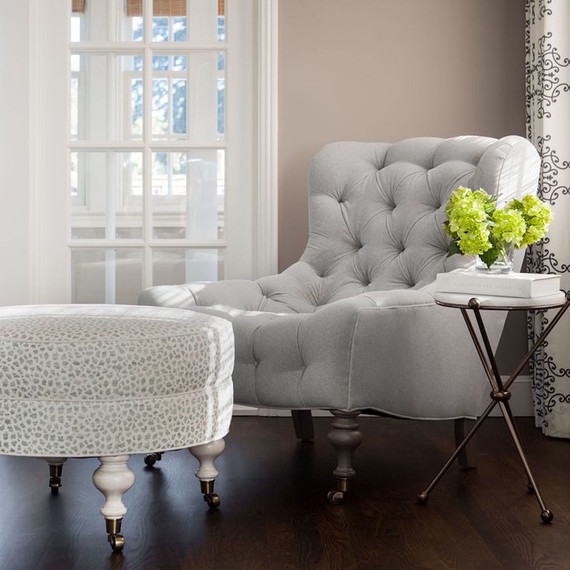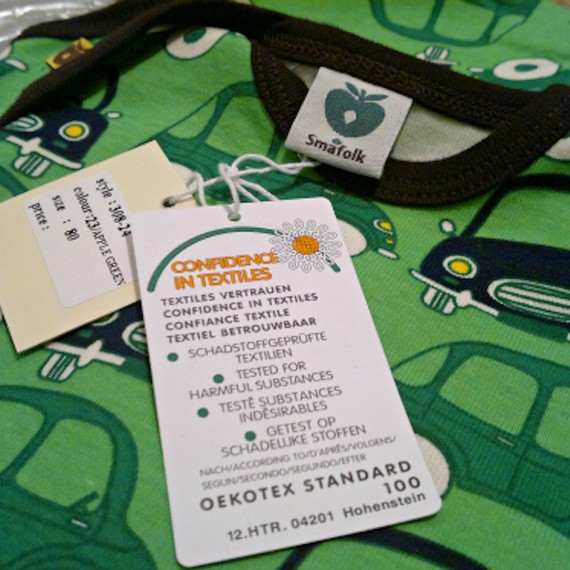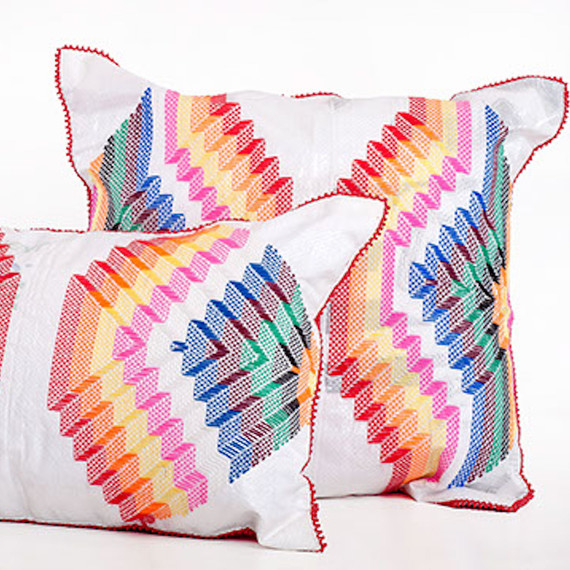Екологични текстил и тъкани за вашия дом

Когато става дума за закупуване на екологично чисти домашни текстилни изделия, помислете за цялостен подход. Например купуването на тениска, направена от 100% органичен памук, може да звучи така, сякаш правите правилното нещо за вас и вашето семейство. Но памук, дори органичен памук, е култура, която изисква много вода в сравнение с други култури (като коноп или лен). И ако боята, използвана за оцветяване на тази тениска, не е с нисък удар, тогава шансовете са огромен количеството вода е използвано в производствения процес. Освен това токсично боядисване, което се изхвърля в местната водна система, може да навреди на служителите, работещи във фабриката.
Като се има предвид целия процес – събирането на реколтата, производството, производството, корабоплаването – и въздействието, което има върху тялото и домовете ни, е наша отговорност като образовани потребители. Проблемът е, че пълната оценка и проверка на вашите кърпи за баня, легла и драперии невинаги са бързи или лесни. Точно като пазаруването на “здравословни” храни в магазина за хранителни стоки, количеството информация, което може да се разгледа, може да бъде огромно.
За щастие за нас съществуват няколко организации, които помагат на ветеринарите и сертифицират производителите на текстил и домашни стоки за потребителите. Тези сертифициращи компании не само помагат да се създаде аудитория от по-информирани купувачи, те дават на компаниите конкурентно предимство на пазара.
Image намерен тук.

На неотдавнашното световно текстилно шоу, наречено Heimtextil, във Франкфурт, Германия, хиляди доставчици, производители, дизайнери и търговци на дребно се събраха, за да покажат новостите в света на текстилното производство. Това включва спално бельо и покривки за маса, възглавници за възглавници, възглавници и матрачни корици, килими, болнични спално бельо и всякакви други тъкани или извити продукти. Една от най-интересните групи изложители бяха устойчивите производители на домашен текстил, които предложиха иновативни екологични продукти. Текстилната индустрия е известна със замърсителите; но има надежда в многобройните организации, посветени на подпомагането на производителите да одитират фабриките си и да направят положителни промени във веригата за доставки. Някои от тези организации може да ви са запознати – ако не, помолете Вашия търговец на дребно, ако техният текстил има някоя от тези сертификати.
- GOTS – Глобален стандарт за органичен текстил Тази организация определя стандарта за сертифициране на органични влакна и се фокусира върху екологичните и социалните стандарти в текстилната промишленост. Тя забранява наемането на деца и използването на генетично модифицирани организми и високорискови химикали. Строги изисквания са и за пречистването на отпадъчните води.
- Справедлива търговия Тази група има за цел да защити живота на памукопроизводителите от цял свят. Става дума за фиксирани минимални цени за памука и спомага за подобряване на условията на живот и труд на земеделските стопани.
- GoodWeave GoodWeave има за цел да сложи край на практиката на детски робски труд в индустрията на килимите и тъкането в Индия, Непал и Афганистан. Организацията помага за спасяването на тези деца и им дава възможност да продължат образованието си. Потърсете килими със символа GoodWeave, за да сте сигурни, че купувате продукт, който не е бил направен с помощта на детски труд. Друга организация, която прави подобно сертифициране в Индия, е Rugmark India, проверете уебсайта си, за да научите повече.
- RDS – Отговорен стандарт надолу Тази организация за хуманно отношение към животните удостоверява както независими, така и промишлени ферми в производството на пера. Сертифицирането гарантира, че гъските или патиците не са “живи изтръгнати” и че условията са хуманни за животните. Потребителите могат да поискат от своите търговци на дребно информация за начина на проследяване на подложката (възглавници, утешители и т.н.) или да използват уебсайта си, за да намират фирми, които са сертифицирани.
- Oeko-Tex (Международна асоциация за изследване и изпитване в областта на текстилната екология) Oeko-Tex използва сертификат за многоточково сертифициране и независим процес на проверка, за да гарантира, че определен текстил отговаря на строгите си устойчиви изисквания. Те се оценяват въз основа на лабораторни тестове, които гарантират, че тъканта не съдържа вредни, токсични вещества. Броят на сертификациите е огромен, но за щастие те имат функция за търсене на техния сайт, която позволява на потребителите да локализират конкретни марки с този етикет. Ако даден елемент има етикета Oeko-Tex (като горепосоченото изображение), можете да използвате телефона си, за да проследявате откъде идва артикулът.
- Cradle to Cradle Тази организация помага на производителите да реализират потенциала за повторна употреба и рециклиране на стоките или суровините, когато продуктът е достигнал края на употребата си. Целта му е да гарантира, че произвежданите продукти не допринасят за нашето общество.
- CO2 Logic Тази компания се консултира с производителите, за да им помогне да намалят своя въглероден отпечатък. Освен това те предлагат програми за дарения, които помагат да се компенсира всеки въглерод, който понастоящем не може да бъде намален.
Image намерен тук

Вероятно тези допълнителни сертификати добавят към разходите за управление на бизнес. Какво е това в производителите? Освен че се опитват да бъдат етично отговорни, компаниите започват да осъзнават, че съществуват значителни разходи за почистване на околната среда и човешки разходи. Потребителите правят избор с портфейлите си, а експлоатацията на устойчив бизнес е начин да се разграничат от конкуренцията. Питър Робинсън, главен изпълнителен директор на Mountain Equipment Co-op, казва: “Етиката е новата конкурентна среда”.
В Heimtextil имаше много продукти, които бяха не само красиви, нетоксични и устойчиви, но и вдъхновяващи и вълнуващи. Ето само няколко акцента:
- Африка! Ignite Основана в Дърбан, Южна Африка, тази компания е в процес на сертифициране на WFTO и помага да се запази местната култура със своя съвременен декор в дома, вдъхновен от наследството на Зулу. Ръчната бродерия се извършва на рециклирани торбички от миели (царевица).
- Санаа от Kwetu Африка Тази компания за аксесоари е проектирана от угандистката художник Сана Гетая, която превръща рециклирана хартия и местни материали в бижута и друг декор, като например рогозки. Стари книги, списания и плакати са изработени в мъниста. Тази трудна практика създава заетост за жените в град Кампала. Те също са в процес на сертифициране за WFTO.
- Kirana Mas Homes Тази кошничка-тъкачна компания, базирана в Yogyakarta, Индонезия, създава потребителски кошове – използвайки местни, възобновяеми материали – за клиенти от цял свят. Те помагат и за запазване на местната култура за бъдещите поколения.
- Golden Jute Не само един друг бизнес за кошница, тази базирана в Бангалеш компания в Дака е посветена на използването на възобновяеми екологични материали – като юта -, които помагат за запазването на местните умения за тъкане.
- Mungo Тази южноафриканска текстилна компания използва старинни станове и местни занаятчии, за да създава спално бельо и стоки. Те включват възобновяеми материали, социално производство и спомагат за запазването на местната култура.
-
Libeco Тази луксозна компания за бельо е основана в Белгия през 1864 г. Тяхното ленено бельо е изработено от лен, за който се знае, че е устойчива култура (лена не изисква вода по време на растеж, не се нуждае от химическо третиране и всички части на растението се използват в производство). Либеко се откроява от другите производители на бельо със своите строги практики за устойчивост. Те предлагат продукти GOTS и Oeko-Tex 100; експлоатира мелница с въглеродна неутралност; и наемат използването на слънчева енергия, LED осветление и по-енергийно ефективен автомобилен парк. Всички емисии, които не могат да бъдат намалени, се компенсират от подкрепата на компанията за програма в Уганда, която помага за производството на печки за готвене, които предотвратяват обезлесяването и подобряват здравето на тези, които използват печката. Освен това, Libeco си партнира с Cradle to Cradle, за да гарантира, че продуктите им се произвеждат по устойчив начин, не са вредни за хората и околната среда и че продуктите могат да бъдат повторно използвани или рециклирани в края на техния живот.
Снимката е предоставена от Африка!

27.04.2023 @ 10:36
More than ever, you have a choice in the sustainability of the fabrics you buy for your home. When it comes to purchasing environmentally friendly home textiles, think about a holistic approach. For example, buying a t-shirt made from 100% organic cotton may sound like you are doing the right thing for you and your family. But cotton, even organic cotton, is a crop that requires a lot of water compared to other crops (like hemp or linen). And if the dye used to color that t-shirt is not low-impact, then chances are a huge amount of water was used in the production process. Additionally, toxic dyeing, which is discharged into the local water system, can harm factory workers. Considering the entire process – harvesting, manufacturing, shipping – and the impact it has on our bodies and homes, it is our responsibility as educated consumers. The problem is that a full assessment and verification of your bath towels, bedding, and drapes are not always quick or easy. Just like shopping for “healthy” food at the grocery store, the amount of information that can be reviewed can be overwhelming. Fortunately for us, there are several organizations that help vet and certify textile and home goods manufacturers for consumers. These certifying companies not only help create an audience of more informed buyers, they give companies a competitive advantage in the market. Labels like this can help you make better, more informed decisions. At the recent world textile show called Heimtextil in Frankfurt, Germany, thousands of suppliers, manufacturers, designers, and retailers gathered to showcase the latest in textile production. This includes bedding and table linens, pillowcases, pillows and mattress covers, carpets, hospital bedding, and all kinds of fabrics or woven products. One of the most interesting groups of exhibitors were sustainable home textile manufacturers who offered innovative eco-friendly products. The textile industry is known for its pollutants; but there is hope in the numerous organizations dedicated to helping manufacturers audit their factories and make positive changes in the supply chain. Some of these organizations may be familiar to you – if not, ask your retailer if their textiles have any of these certifications. GOTS – Global Organic Textile Standard This organization sets the standard for certifying organic fibers and focuses on environmental and social standards in the textile industry. It prohibits child labor and the use of genetically modified organisms and high-risk chemicals. Strict requirements are also in place for wastewater treatment. Fair Trade This group aims to protect the lives of cotton farmers around the world. This means